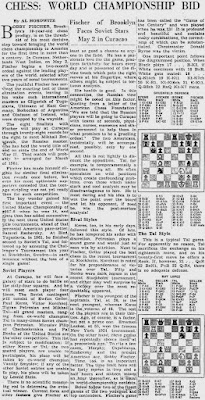New York Times, New York, New York, Sunday, April 22, 1962 - Page 254
Chess: World Championship Bid
Fischer of Brooklyn Faces Soviet Stars May 2 in Curacao
By Al Horowitz
Bobby Fischer, Brooklyn's 19-year-old chess prodigy, is on the threshold of his most decisive step toward bringing the world chess championship to America for the first time in more than a century. In Curaçao, Netherlands West Indies, on May 2, Fischer begins a two-month ordeal against the leading players of the world, selected after two years of zonal tournaments.
The youthful Fischer has survived the exacting test of these elimination events, leaving in his wake such international masters as Gligoric of Yugoslavia, Uhlmann of East Germany, Bolbochan of Argentina and Olafsson of Iceland, who were dropped by the wayside.
The eight finalists with Fischer will play at Curaçao through twenty-eight rounds for the right to meet Mikhail Botvinnik, the Russian master, who has held the world title off and on since the end of World War II. That match will probably be arranged for March of 1963.
Fischer has made himself eligible for similar final elimination rounds once before, but even his most optimistic supporters conceded that the teenage stripling was not yet read then for such competition.
The boy wonder gained his first important event — the United States Championship of 1957-8 when he was 14, and since then has added successively the next three United States title tournaments, ahead of that perennial American pace-setter, Samuel Reshevsky. At Bled, Yugoslavia, in 1961, he finished second to Soviet's Tal, and followed up by annexing the Challenger's Tournament this year at Stockholm, Sweden — in each instance without the loss of a single game!
Soviet Players
At Curaçao, he will face a galaxy of stars to do battle on the sixty-four squares. And he will meet each player four times. The Soviet contingent will consist of Ewfim Geller, Paul Keres, Victor Korchnoi, Tigran Petrosian and Mikhail Tal—all grand masters, ranging from ex-world champion Tal to many-times Soviet champion Petrosian. Miroslav Filip of Czechoslovakia and Pal Benko of the United States are the other competitors. This list is subject to modification: If either Keres or Tal, the two seeded players, are unable to participate, his place will be taken by ex-world champion Vassily Smyslov; if any of the other Soviet entries are unable to play, his place will be taken by Leonid Stein.
There is no scientific measuring rod to determine the eventual winner. Current form and other factors give Fischer at least as good a chance as anyone in the field. He has a passionate love for the game, practices faithfully for hours everyday and is possessed of the divine touch which puts the right moves at his fingertips, where others might be subject to tortuous analysis.
His health is good. In this connection, the Russian view might be noted on this factor. Quoting from a letter of the American Chess Foundation: “We are told that the Russian players will be going to Curaçao with teams of seconds, physicians, nurses, masseurs and other personnel to help them in what promises to be a grueling order.” The two Americans, incidentally, will be accompanied, possibly, only by one second.
All this is not lightly to discount the opposition. Tal, for example, is temperamentally a tactician above all. He often speculates on wild positions which create confounding problems, even those which under stark and cool analysis may be disadvantageous to him. He is most daring and his idea is to win the point over the board and let his opponent, if need be, win the postmortem analysis!
Rival Styles
Keres, too, in his early days, followed this style. Of late, he has tempered his ardor with discretion. Petrosian plays a sound game and would just as soon win by attrition. Next to Fischer, Geller played the best chess in the recent tournament at Stockholm. Korchnoi is noted for his preponderance of victories over Tal. Filip and Benko were dark horses in the recent Stockholm tournament, and either may well surprise by a victory over the most redoubtable opponent.
Fischer is the youngest of the aspirants. Tal, at 26, is the next youngest, whereas Keres is the veteran of 46. The rest of the players are in their thirties. Age, of course, is a factor, but not a prime one. Emanuel Lasker, at 55, won the famous New York 1924 tournament. On the other hand, chess genius has repeatedly shown itself at a precocious age. To cite a few cases, Morphy, Capablanca, Reshevsky and the present American ace, Bobby Fischer.
Time, too is an important factor. The time limit here will be forty moves in two and a half hours and sixteen moves an hour thereafter, as is usual in a world championship contests.
Below follow two of the finest games of the two youngest and top contenders. Fischer's game has been called the “Game of the Century” and was played when he was 13! It is profound and beautiful and contains many combinations, the correctness of which can be substantiated. Chess master Donald Byrne was the victim.
One important point follows the diagrammed position. When Black plays 17 . . .
The Tal Style
This is a typical Tal game. For apparently no reason, Tal sacrifices the exchange on his eighteenth move, and on his twenty-first move he offers a Rook. If, however, 21 . . .QxR 22 BxKt, PxB 22 Q-R4, there is no adequate defense.























